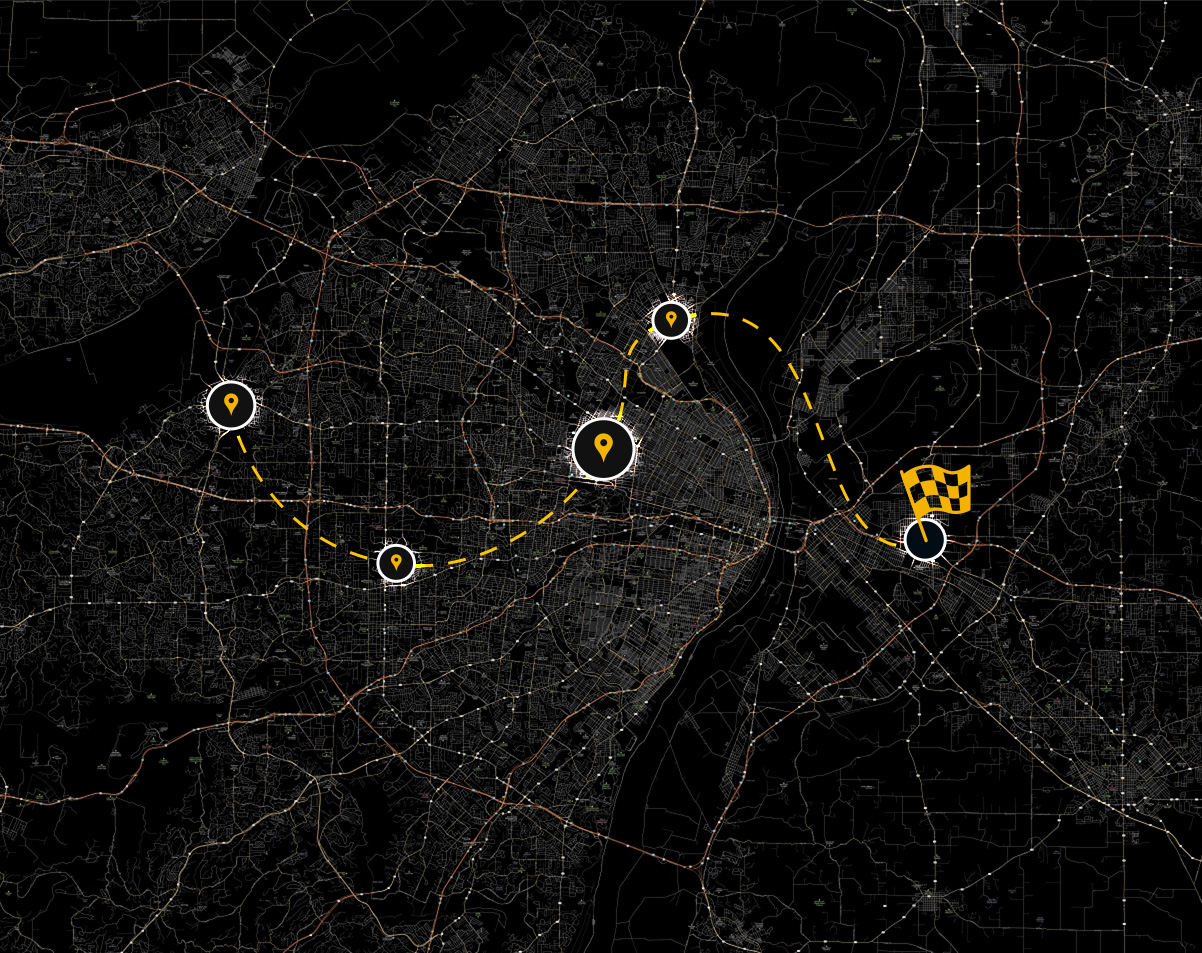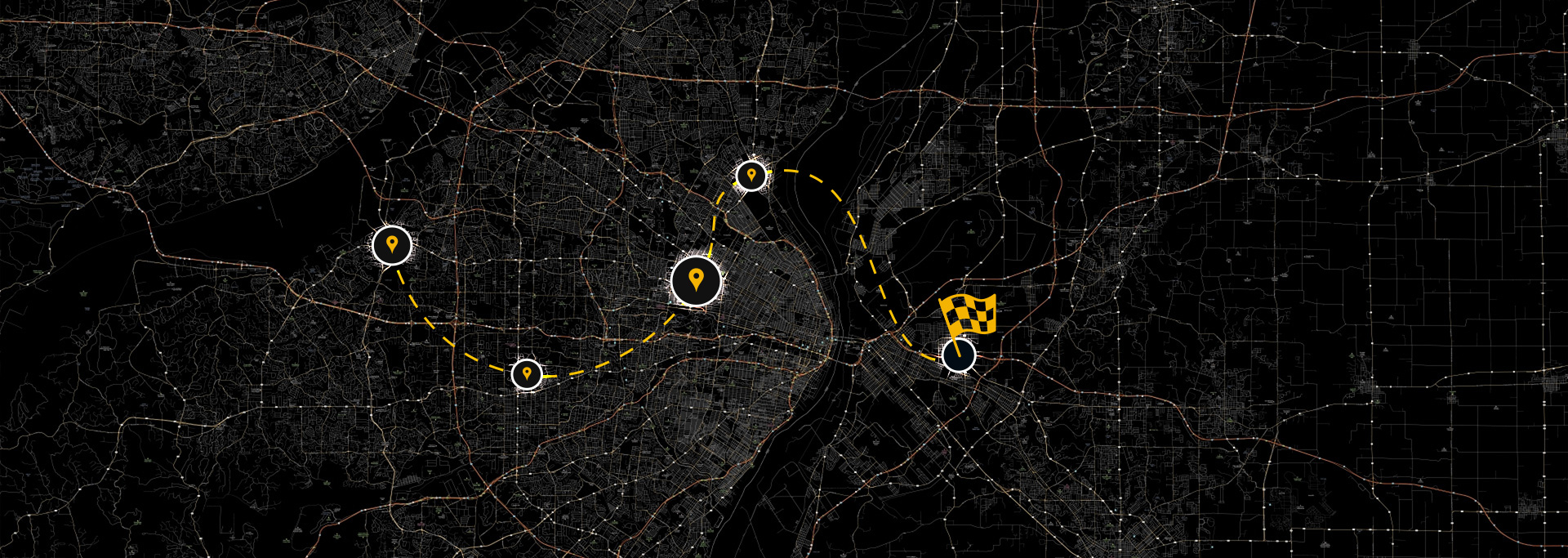The core of MaxQuest
MaxQuest is a time-limited game that runs along a fixed route, takes place in a certain area, in the real world and in real time. The MaxQuest route consists of consecutive checkpoints (certain locations in the real world) that participants need to visit one after another. Check-point came up in the guise of the puzzle, which you have to solve by using logic and savvy. If it is not possible to solve it, after a certain time the participants get clues up to the exact place of the checkpoint you need. MaxQuest is bound to a specific location and to participate you will need to physically arrive at the launch site, and then visit all the check points. Each point is a place in the real world (city or on the road), which has a clear localization (intersection, house number, object). To pass a specific checkpoint, the participant needs to physically arrive at the site and communicate through the application. After the successful passage, the participant gets the next point. Getting points and fixing their passage is realized through the application for the smartphone. The winner is the one who has passed all the points faster than the others.

History

In 1963, the film "What a crazy world" was starred in the United States. There, drivers who learned about the place where US $ 350,000 were hidden try to get to the right place before rivals using various vehicles.
In 1973, in Los Angeles, designer Donald Laskin and his friend Patrick Carlisle came up with the game "The Game". The essence of the game was to solve puzzles, solving which it was necessary to move around the city all night. Despite the fact that the "Game" was an "underground" event, she drew the attention of The Los Angeles Times.
In 1980, based on the play by Walt Disney, the film "Midnight Madness" was filmed.
In 1997, the film "The Game" by David Fincher came out. There is an opinion that it was based on the play of Donald Laskin.
In 2001, the film "Rat Race" was shot on the subject of which random people became participants in the race for the United States with a large monetary prize.
In 2007, the series "Race" appeared on the screens, according to the story of which a couple of participants on cars move from city to city, participating in the elimination race.


The formula of MaxQuest
MaxQuest is based on the three important components:
- 1 The Excitement. You can risk and win. In this case, if in classic gambling luck means everything, in MaxQuest everything depends on you.
- 2 The Quest. You participate in a quest - a fascinating adventure in the real world with puzzles and interesting places.
- 3 The Race. You compete with other participants, and the outcome depends more on your wits than on the speed of the car. Unlike a real sports race, it's safe and runs on public roads.

Problem-Solution
- 1. Lack of excitement and motivation. In case of losing, parties do not lose anything. Most of the time, the winner gets nothing for the effort.
- 2. Local in nature. Similar projects exist within the same city or at most a few and rarely are global in nature.
- 3. The technical side. Modern applications and technologies and smartphones features are rarely used in Most projects. That makes the game mechanics simple and not very diverse.
- 4. No offer for a premium audience. Low budget or even non-commercial projects are not interested to a premium audience. There are no services and content.
- 5. The niche nature inherent to such projects stands in a way of popularity. Such projects are designed for a small number of people (narrow segment of consumers). They are known among a few people (the core audience) and those who with these people in contact.
- 6. High threshold entry. Entry threshold into such games often higher due to the experience, expertise and the necessary equipment.
- 7. Amateur in nature. The organizers of such races not use to be professionals. this is the reason of low quality, diversity and permanence in such quests.
- 8. The lack of funding. Small distribution and low prices or in general non-commercial nature don’t make possibility of development, promotion and high-quality team recruiting for such projects.
Excitement
Excitement is the human emotion that motivates for success. This emotion is a subject of great interest to certain actions and encourages continuing them.
Life without passion is dull and boring. Any success in sports, career or business could be hardly achieved without it.
The dice game has been known in Ancient India and all around the world. Indian collection of the Vedic hymns "The Rigveda" contains the poem "player complaints”. The Bhavishya Purana has a story associated with gambling: a certain Prince has lost everything, including his own wife, because of the playing dice. The epic Mahābhārata refers to the dice as to the gambling game, nevertheless describing it in details.
The first-ever English lottery took place in London in 11 January 1559. Solemn ceremony of the awarding prixes took place not somewhere but in the Church in the Cathedral of St. Paul.
From an economic perspective, lottery is making wagers on money or any material value on the event with shady outcome with the primary intention to make profit or become wealthy. Gambling depends more on luck than on the art of playing, and often the size of the bets is assigned randomly and could be changed during the play. The primary interest is focused not on the game process, but on the outcome of its.
Our quest mainly differs from classic gambling. The decisive factor is not luck, but the participants` skills, aimed to take the quest.


